| By Joan Garland, ICF Outreach Coordinator
A team of Texas teachers helped us to develop and pilot the first part of this national program, Estuaries in the Balance, which focuses on the estuary ecosystem in the Coastal Bend of south Texas where the Whooping Cranes winter. We will develop and test similar programs with educators in the other two Whooping Crane populations—the reintroduced eastern migratory population and the non-migratory population introduced in Louisiana.
We hope to host the Louisiana education staff and K-12 educators in the Texas Coastal Bend this winter as we further develop the National Whooping Crane Environmental Education program. Education that builds awareness and enthusiasm to protect Whooping Cranes is the key to protecting one of North America’s most endangered birds. Attention Teachers! While the Estuaries in the Balance program’s focus is on the Texas Coastal Bend, the program provides a wealth of information on Whooping Cranes and coastal wetlands that can be adapted for your classroom. For additional information on involving your students or opportunities for teacher workshops, please contact ICF at info@savingcranes.org or (608) 356-9462. |
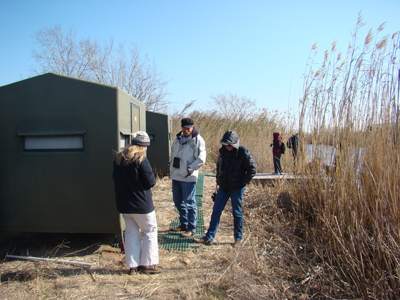 The Texas educators visit the Whooping Crane pen site viewing blinds at the White Lake Wetlands Conservation Area in southern Louisiana (top) and view released Whooping Cranes in the wild with staff from the Louisiana Department of Wildlife and Fisheries. The Texas educators visit the Whooping Crane pen site viewing blinds at the White Lake Wetlands Conservation Area in southern Louisiana (top) and view released Whooping Cranes in the wild with staff from the Louisiana Department of Wildlife and Fisheries. |
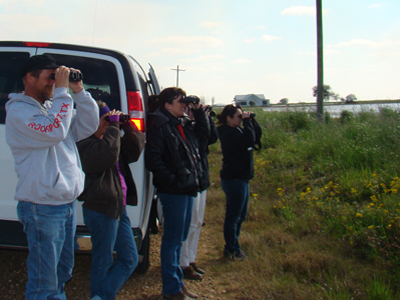 |
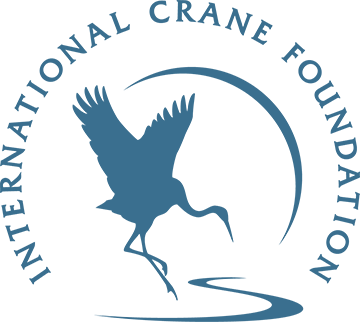
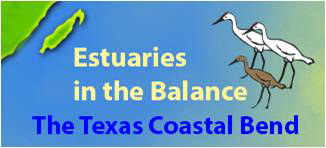 ICF recently launched an initiative to develop a National Whooping Crane Environmental Education program. This program, aimed at 4th – 8th grade students, teachers, families, and the general public, will involve interactive multi-media tools to engage people in Whooping Crane conservation. We started this work in Texas through a partnership with Hamline University’s Center for Global Environmental Education and Texas A&M University-Corpus Christi’s Harte Research Institute for Gulf of Mexico Studies.
ICF recently launched an initiative to develop a National Whooping Crane Environmental Education program. This program, aimed at 4th – 8th grade students, teachers, families, and the general public, will involve interactive multi-media tools to engage people in Whooping Crane conservation. We started this work in Texas through a partnership with Hamline University’s Center for Global Environmental Education and Texas A&M University-Corpus Christi’s Harte Research Institute for Gulf of Mexico Studies.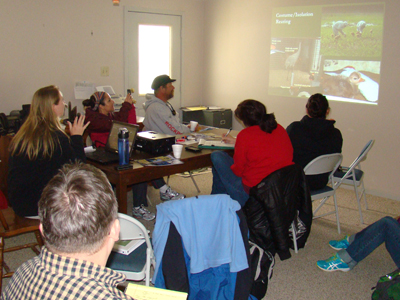 To facilitate information-sharing with our Texas teachers and educators in Louisiana, ICF launched an educator-exchange program and teacher training workshop this past February (left). This program was sponsored by ICF, the Harte Research Institute, and Texas-based Coastal Bend Bays and Estuaries Program. Eight Coastal Bend educators visited the Whooping Crane reintroduction site at White Lake Wetlands Conservation Area in southern Louisiana and met with education staff from the Louisiana Department of Wildlife and Fisheries to learn about their Whooping Crane environmental education programming and share environmental education teaching tools and techniques.
To facilitate information-sharing with our Texas teachers and educators in Louisiana, ICF launched an educator-exchange program and teacher training workshop this past February (left). This program was sponsored by ICF, the Harte Research Institute, and Texas-based Coastal Bend Bays and Estuaries Program. Eight Coastal Bend educators visited the Whooping Crane reintroduction site at White Lake Wetlands Conservation Area in southern Louisiana and met with education staff from the Louisiana Department of Wildlife and Fisheries to learn about their Whooping Crane environmental education programming and share environmental education teaching tools and techniques.